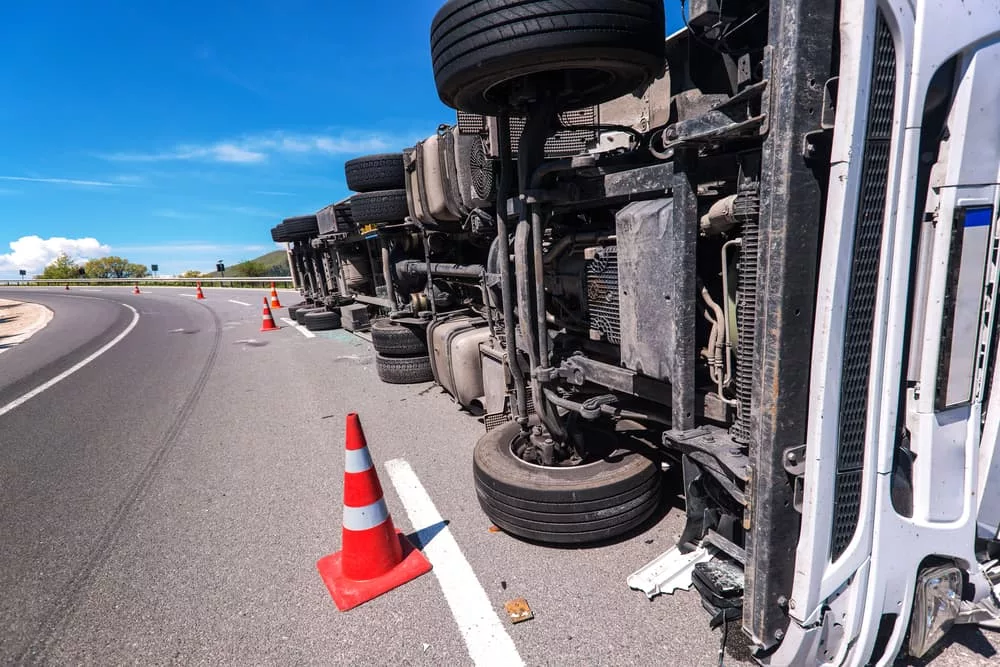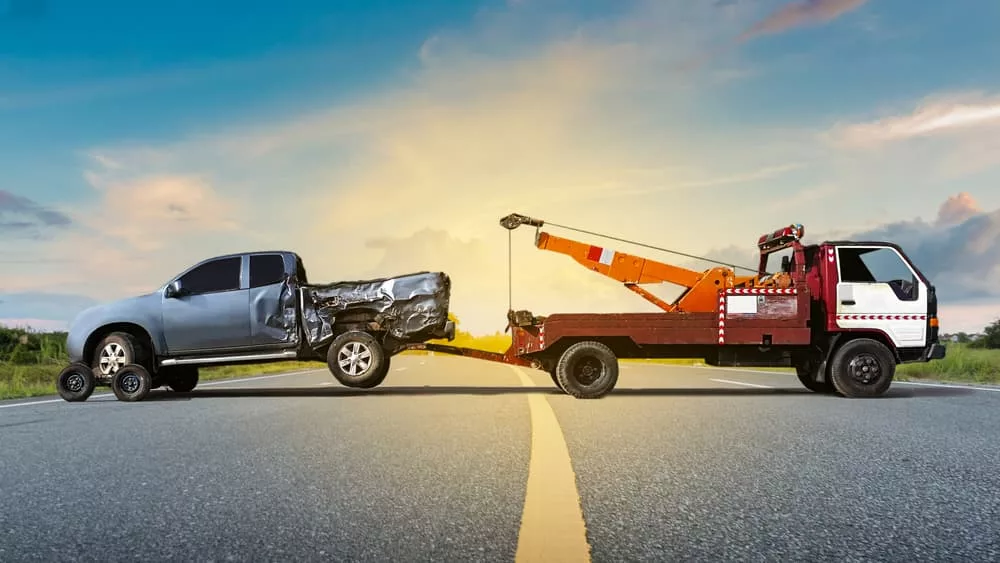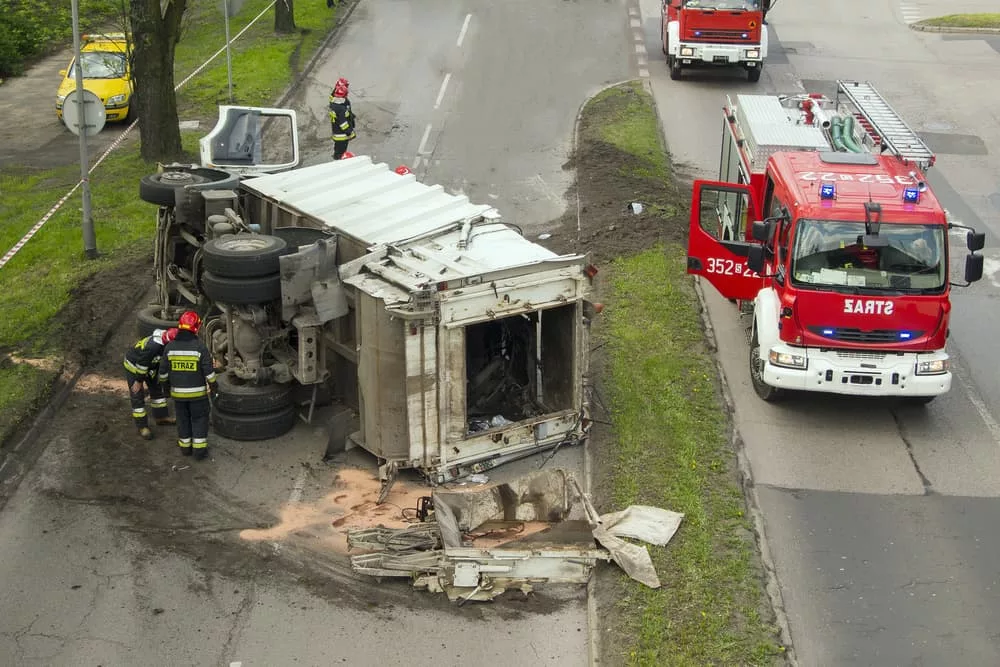Truck accidents have devastating and long-lasting effects on the victims’ lives, leaving them to navigate through physical, emotional, and financial challenges. You need to determine fault in these complex cases to obtain the compensation you deserve for injuries and losses related to a truck accident.
Identifying the liable party in a truck accident, however, is not always straightforward. Factors such as driver error, trucking company negligence, and third-party involvement could cause the crash.
Below, we will explore the intricacies of truck accident liability, highlighting the potential defendants and shedding light on the factors that can lead to their accountability in these unfortunate incidents.
By having an experienced truck accident lawyer by your side, you can better understand your rights and build a strong case for the compensation you need.
Schedule a Free Initial Consultation Today!
Driver Negligence
Various driver behaviors serve as grounds for driver negligence, ultimately opening drivers to financial liability for damages in a truck accident. They can include the following:
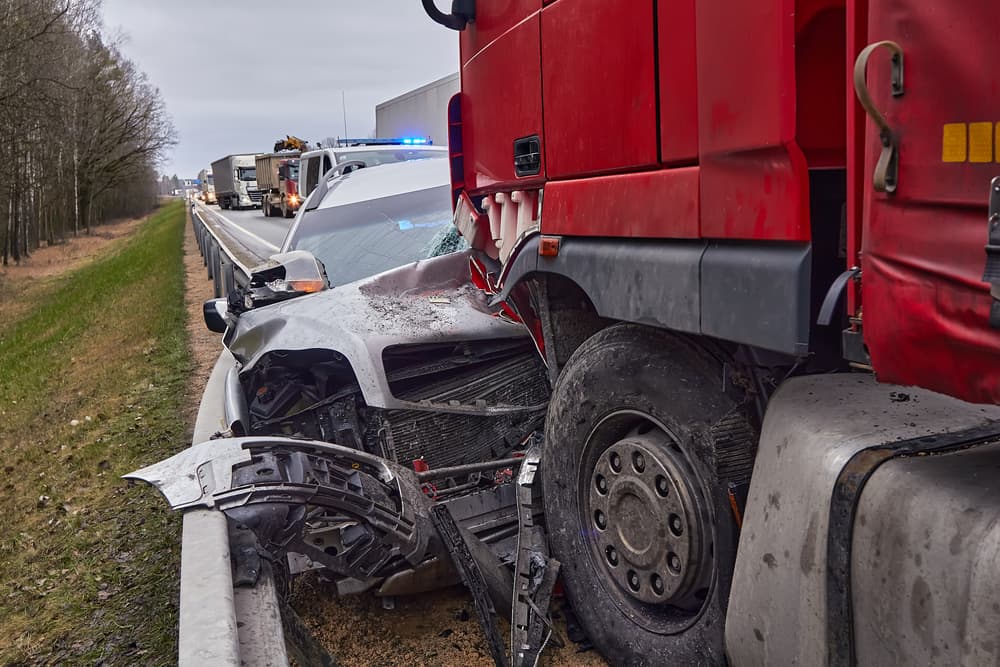
Speeding
Speeding is a leading cause of truck accidents. It reduces the reaction time of drivers and makes it difficult for them to avoid obstacles or react to changes in traffic patterns. An attorney can carefully examine police reports, witness statements, and available video evidence to determine whether speeding contributed to the accident.
Distracted Driving
A texting driver may not pay attention to the road and can easily cause an accident. Your attorney can review phone records, GPS data, and other evidence to establish the driver’s distraction level during the crash.
Driving Under the Influence (DUI)
Alcohol or drug use by truck drivers can impair their ability to safely operate the vehicle. Your attorney can gather evidence of the driver’s impairment, such as the results of a field sobriety test, blood or breath test, or any relevant documentation from the scene.
Violating Traffic Laws
Running a stop sign, making an improper turn, or failing to obey traffic laws can lead to serious truck accidents. An attorney can analyze the events leading up to the crash to determine any traffic law violations.
Trucking Company Liability
Trucking companies make decisions and engage in various practices that can open them to liability for damages after a truck accident due to negligence. Examples of situations where a trucking company could be partially or fully liable include:
Hiring Practices and Training
Trucking companies can be liable for accidents if they engage in negligent hiring practices or fail to adequately train their drivers. Your attorney can investigate the company’s hiring procedures, background checks, and driver training programs to determine if they contributed to the accident.
Vicarious Liability
Under the legal doctrine of vicarious liability, a truck accident victim can hold a trucking company responsible for the negligent actions of its employees, such as the truck driver, if the accident occurred within the scope of their employment. Your attorney will examine the case details to establish a connection between the driver’s negligence and the company’s responsibility.
Maintenance and Inspection
The law requires trucking companies to maintain their trucks in safe operating conditions and conduct regular inspections. If a company fails to adhere to these standards and an accident occurs, a victim can hold it liable. Your attorney can review maintenance records, inspection reports, and other evidence to determine if company negligence played a role in the accident.
Compliance with State and Federal Regulations
Trucking companies must adhere to state and federal regulations, such as hours of service rules, drug and alcohol testing, and weight limits. Non-compliance with these regulations can lead to accidents and expose the company to liability. Your attorney can investigate whether any regulatory violations occurred and use this information to strengthen your case.
In one notable case, a trucking company was liable for an accident in which their driver fell asleep at the wheel and caused a multi-vehicle collision. Investigation authorities discovered that the company had failed to enforce hours of service regulations, leaving the driver dangerously fatigued.
In another example, authorities held a company responsible for an accident involving one of their drivers with a history of DUI convictions. The company’s failure to conduct a proper background check and assess the driver’s suitability for the job demonstrated negligence on their part.
In both instances, authorities held the trucking companies accountable for their actions, and the victims received compensation for their injuries and losses.
Poor Truck Maintenance
We mentioned poor maintenance practices above, but it deserves special treatment because of the severe consequences that occur when trucking companies fail to maintain and fix their trucks.
Various issues with truck maintenance can lead to a mechanical breakdown at a crucial point, causing dangerous truck accidents.
Common mechanical issues that lead to truck accidents include:
- Brake malfunctions: Brake failures can result in devastating accidents, as the truck driver may be unable to slow down or stop the vehicle in time to prevent a collision. Your attorney can investigate the vehicle’s maintenance history and consult with experts to determine if brake failure contributed to the accident.
- Tire blowouts: A tire blowout can cause a truck driver to lose control of the vehicle or force the truck to veer into other lanes, leading to severe accidents. Your attorney can review tire maintenance records and determine if the trucking company inspected and replaced tires at proper intervals. Failure to change worn-out tires can open trucking companies to liability for damages in an accident.
- Steering system failures: A malfunctioning steering system can make it difficult or impossible for the driver to control the truck’s direction, potentially causing an accident. Your attorney can investigate the truck’s maintenance records for any signs of steering system failure or evidence of repair or replacement.
Liability of Trucking Companies and Manufacturers
Both trucking companies and vehicle manufacturers can be responsible for accidents that result from vehicle maintenance issues or product defects. If a trucking company fails to properly maintain its vehicles or a manufacturer produces a truck with inherent defects, authorities can hold them responsible for the damages.
Your attorney will thoroughly investigate the accident to determine the underlying cause and identify the responsible parties.
Cargo-Related Issues
The proper loading and securing of cargo are crucial to ensuring the safe operation of a truck. Improperly loaded cargo can shift during transport, causing the truck to become unstable and potentially resulting in an accident. Your attorney can investigate the circumstances surrounding the loading and securing of cargo to determine whether negligence played a role in the accident.
Improperly loaded cargo can create several hazards, including:
- Unbalanced weight distribution: When cargo has improper distribution within the truck, it can cause the vehicle to become unstable, making it more difficult for the driver to control and increasing the likelihood of an accident.
- Shifting cargo: Unsecured and untied cargo can shift during transport, causing the truck to become unbalanced or the cargo to fall off the vehicle, putting other motorists at risk.
- Overloaded vehicles: Overloading a truck can result in reduced braking effectiveness, increased risk of tire blowouts, and loss of vehicle control. It may also lead to extreme stress on the vehicle components, increasing the likelihood of mechanical failure.
Both trucking companies and cargo loaders can be responsible for accidents resulting from improperly loaded or secured cargo. The liability may lie with the trucking company if it fails to provide adequate training, equipment, or oversight to ensure safe cargo loading. Alternatively, if an independent cargo loader was in charge of loading the truck, they could also be responsible for their negligence.
Third-Party Liability
Other parties besides a truck driver or trucking company can be partially or fully liable for a truck accident. The most common third-party liability scenarios involve other motorists and government entities.
In some cases, other drivers’ negligence may contribute to a truck accident. For example, a driver may cut off the truck or follow it too closely, making it difficult for the truck driver to avoid a collision. Your attorney will examine the actions of all parties involved in the accident to determine if any third-party negligence contributed to the incident.
Poor road maintenance, defective traffic signals, or inadequate signage can also contribute to truck accidents. In such cases, government entities responsible for maintaining safe roadways may be responsible for damages due to their negligence. Your attorney will investigate the condition of the road and traffic signals at the time of the accident and determine whether any government entities are responsible for the mishap.
Determining Shared Liability Among Multiple Parties
In some truck accident cases, investigators may find more than one party at fault. For example, the truck driver may have been speeding while another driver was texting and not paying attention to the road. In such cases, the concept of shared liability or comparative negligence may come into play, and your attorney will work to accurately apportion fault among the involved parties.
State and Federal Regulations
As mentioned above, truck drivers and trucking companies must comply with state and federal regulations.
Overview of Federal Motor Carrier Safety Regulations (FMCSRs)
FMCSRs are a set of federal regulations governing the trucking industry to ensure the safety of commercial motor vehicles, including trucks. These regulations cover various aspects, such as driver qualifications, hours of service, vehicle inspection, and maintenance. Compliance with FMCSRs is mandatory for trucking companies and drivers, and non-compliance can serve as evidence of negligence in a truck accident case.
State-Specific Trucking Regulations
In addition to federal regulations, each state has its own set of trucking regulations that govern the operation of commercial vehicles within its borders. These regulations may cover weight limits, permits, and route restrictions. Your attorney will be familiar with the state-specific regulations applicable to your case and can use any violations to establish negligence.
Non-Compliance as Evidence of Negligence
If a truck driver or trucking company violates state or federal regulations, this non-compliance can be evidence of negligence in a personal injury case. For example, if a driver exceeds the maximum allowed hours of service or a trucking company fails to conduct proper vehicle inspections, this can act as a breach of their duty to exercise reasonable care, which may have contributed to the accident.
In one case, a truck driver caused an accident after falling asleep at the wheel due to violating the hours of service regulations. The trucking company shared liability with the driver for failing to monitor the driver’s compliance with the regulations.
In another case, a brake failure caused a truck accident due to the trucking company’s negligence to conduct regular maintenance and inspections. The court found the trucking company liable for the injuries sustained in the accident.
Contact a Truck Accident Lawyer for the Legal Help You Need
Determining liability in a truck accident is a complex process that involves analyzing various factors, such as driver negligence, trucking company liability, vehicle maintenance and defects, cargo-related issues, and third-party liability.
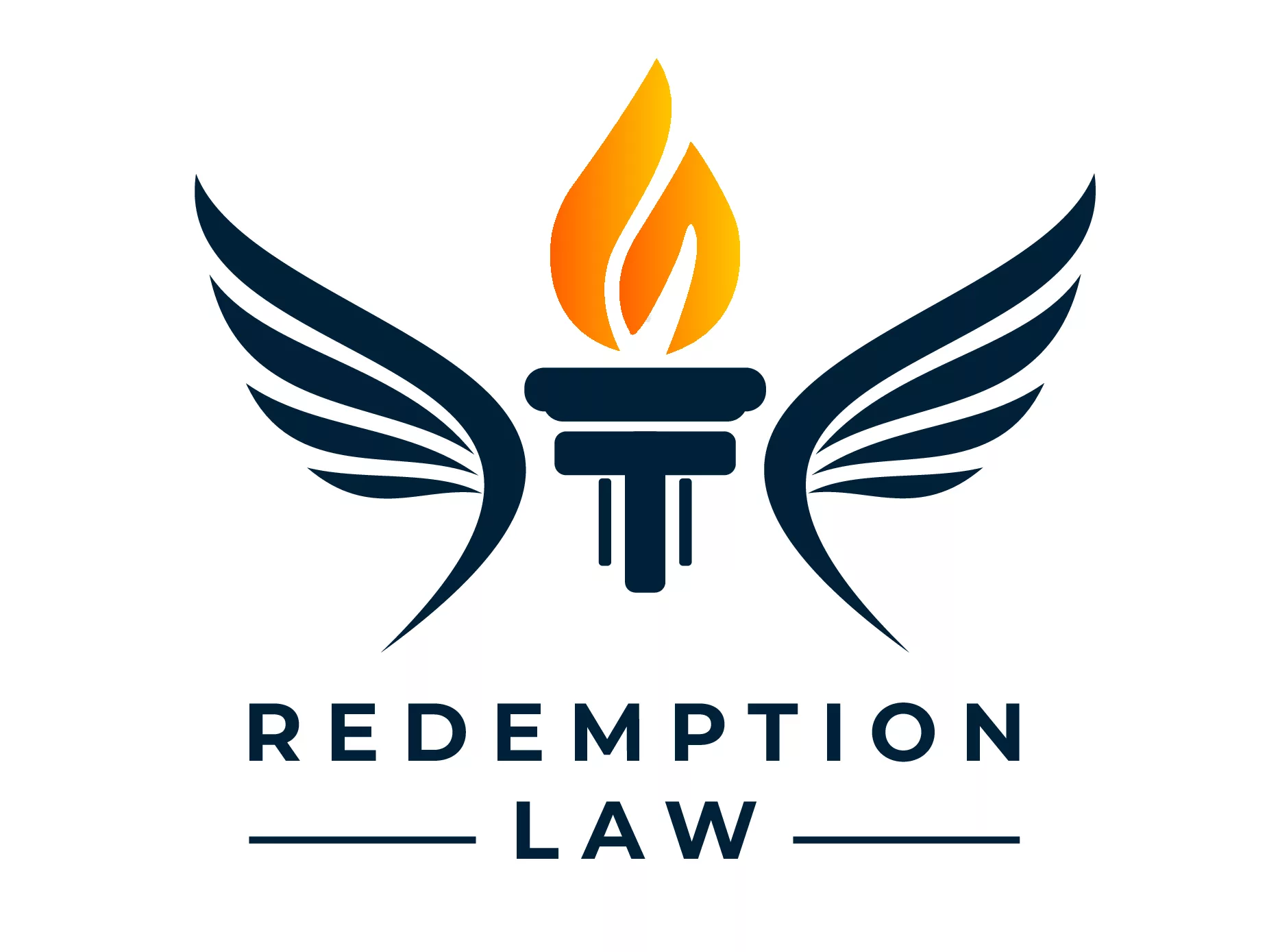
Additionally, state and federal regulations and the statute of limitations can influence a victim’s ability to recover damages. Utilizing expert witness testimony and collecting comprehensive evidence helps establish liability and builds a strong case.
Working with an experienced personal injury lawyer is essential to navigate the intricacies of truck accident cases. A skilled attorney can investigate the accident, identify all liable parties, gather and preserve essential evidence, employ expert witnesses, and handle negotiations with insurance companies or opposing counsel.
By enlisting the help of a knowledgeable personal injury lawyer, victims of truck accidents can increase their chances of receiving the compensation they need to cover medical expenses, lost earnings, pain and suffering, and other damages.
With the assistance of a qualified personal injury attorney, truck accident victims can pursue compensation for various damages, such as medical bills, lost income, property damage, and pain and suffering. Depending on the case’s specifics and the extent of the injuries sustained, victims may also recover non-economic damages for emotional distress or loss of enjoyment of life.
Proving liability and securing a favorable outcome in a truck accident case can significantly affect the victim’s financial recovery, quality of life, and overall well-being.



